Profile of Storage Start-Up Leil Storage
Promoting secondary storage combining SMR HDDs, distributed file system and spin-down approach
By Philippe Nicolas | April 25, 2024 at 2:02 pmCompany name:
Leil Storage
HQ:
Tallinn, Estonia
Website:
leil.io
Date founded:
November 24, 2022
Founders:
 Aleksandr Ragel
Aleksandr Ragel
 David Gerstein
David Gerstein
Aleksandr Ragel, alongside David Gerstein, founded Diaway, an Estonian global system integrator serving software and cloud businesses. With a collective experience of 30 years between them in various international organizations, they have developed Diaway into a company recognized for its expertise in managing data center operations and constructing large-scale, economically efficient data infrastructures. Ragel’s proficiency lies in optimizing business processes through smart technical solutions, contributing significantly to Diaway’s ability to offer customized, cost-effective solutions to its diverse global clients.
In addition to Diaway, Gerstein and Ragel are involved in Leil Storage, a software company focused on modern, green, and sovereign data storage solutions that embodies a philosophy rooted in sustainability and innovation, aiming to address long-standing inefficiencies in the data storage sector with a keen eye on environmental sustainability.
Financial funding:
Funded by the group company with €1 million+
Employees numbers:
18+
Revenue:
Sales started, revenue recorded, exact numbers may follow a little later as some contractual work is in progress
Technology:
A modern C++-written distributed POSIX filesystem with Host-managed SMR and Power pin3 HDD support
Products:
The company designs and develops a modern secondary storage architecture available as a scalable modular rack exposed with file system and S3 interfaces. This storage subsystem leverages a distributed file system inspired by Google File System coupled with Reed-Solomon erasure coding associated with a power and spin-down HDD control. The file system is SaunaFS and the physical offering is known and sold by Leil Storage.
Click to enlarge
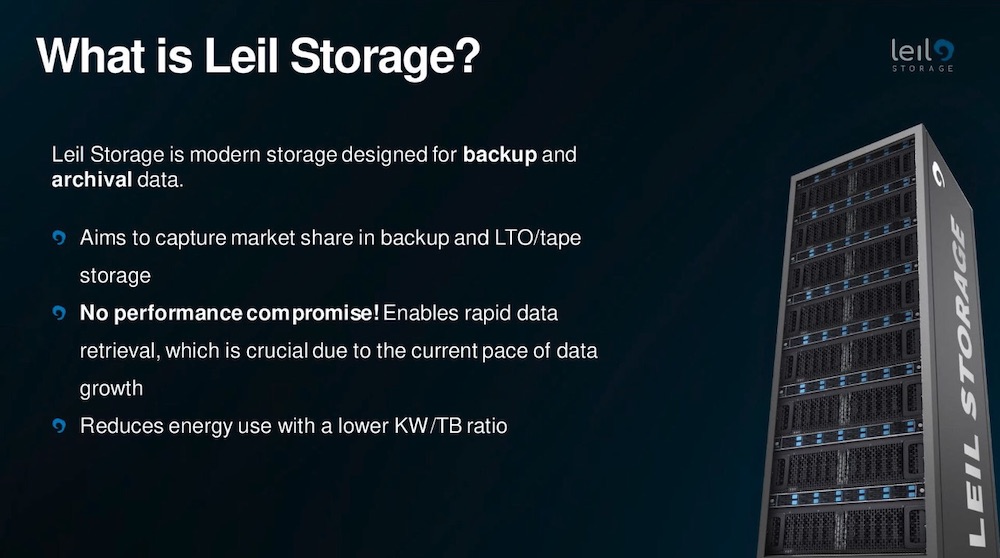
Release and roadmap:
SaunaFS 4.0.0 and Leil Storage 1.0 including 2nd enhanced version of HM-SMR support released on February 29, 2024. The current SaunaFS version is 4.0.7.
By 2025: ICE (Infinite Cold Engine) – the feature that unlocks 25%+ energy savings by supporting the power pin3 feature of HDD. The feature will be rolled out to the existing customers via the software updates
Click to enlarge
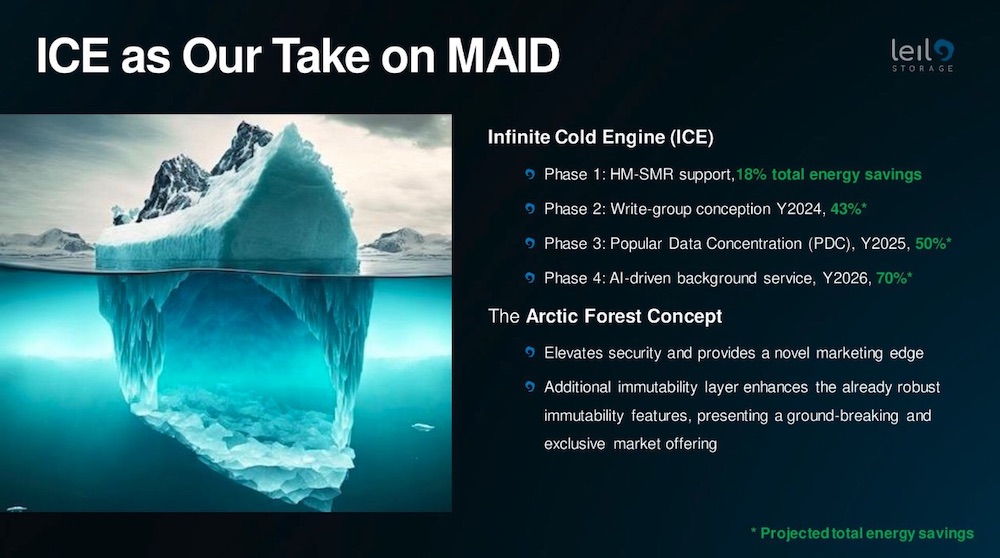
Pricing model:
Leil Storage, CapEx upfront payment for the usable capacity for a 3- or 5-year term, the product consists of hardware, software
SaunaFS, Software License & Support monthly, yearly, or upfront payment for the raw capacity for a 3- or 5-year term
GTM:
Leil Storage GTM Strategy
- Target Markets: Data-intensive organizations across sectors like healthcare, media, and government, focusing on scalable and environmentally friendly archival and backup data storage solutions
- Value Proposition: Offering high-performance, greener storage technologies for on-premise deployment, reducing energy consumption and operational costs
- Partnerships: Collaboration with system integrators, consultancies, and service providers to tailor solutions for diverse industry needs
SaunaFS GTM Strategy
- Value Proposition: Emphasizes ease of use, lower hardware requirements, and efficient scaling up to 1EB, making it ideal enterprises with massive data storage needs
- Target Engagement: Focus on industries requiring fast and efficient storage and retrieval, highlighting cost savings and simplified storage management
- Partner Channel: Works with SIs, consultancies, and server hardware vendors to optimize performance and ease deployment
Customers:
Into media storage, enterprise file sharing and service provider backup data
Workloads/Use cases/Applications:
- Archives (WORM, WORO)
- Backups, supported: Acronis Cyber Protect Cloud, Acronis Cyber Protect, Cohesity DataProtect, Veeam Backup & Replication, Veeam Backup for Microsoft 365, Rubrik Security Cloud
SaunaFS/Leil Storage verticals
- Media and post-production
- Oil and gas and energy
- Healthcare imagery & PACS
- Smart cities and CCTV
- Government and public Sector
- Microsoft 365 and UCaaS backup
- Biotech, pharma and life sciences
- Higher education and scientific labs
- Geospatial
- E-commerce
- Data-intensive enterprises
- Telecom
Target market:
- TAM: The cloud storage market was worth $70.19 billion in 2021, and it is expected to be worth $376.37 billion by 2029, at a CAGR of 24.% from 2022 to 2029
- SAM: By deployment mode (cloud, on-premises), and by geography. According to Verified Market Research, the enterprise information archiving market was valued at $7.5 billion in 2021 and is projected to reach $22.4 billion by 2030, growing at a CAGR of 16.8% from 2022 to 2030
- SOM: Targets to obtain 1% of SAM: $75 million (1.2EB in 3 years)
Competition:
- Tape Libraries: Tape storage remains one of the most cost-effective and reliable solutions for long-term, large-scale data archiving on-premises. Modern tape libraries can automate tape management and provide capacities that extend into the exabyte range when fully scaled. Tape’s longevity, low cost per terabyte, and low energy consumption make it for long-term data retention.
- High-Capacity HDD Arrays: Deploying arrays of high-capacity HDDs within traditional SANs or NAS can provide the necessary scale for multi-petabyte storage needs. Enterprises can leverage RAID configurations to enhance data reliability and availability. Innovations in helium-filled and SMR HDDs have significantly increased the storage density of these devices.
- Object Storage Systems: On-premises object storage systems offer highly scalable and flexible solutions for managing and storing vast amounts of unstructured data. Object storage platforms like MinIO, Ceph, and Dell EMC ECS can be deployed within an organization’s data center, providing the ability to scale to petabytes and beyond while offering robust data management features and the ability to handle a high volume of concurrent requests.
- SDS: SDS solutions abstract the storage hardware and pool together various storage resources, offering a flexible and scalable way to manage storage infrastructure. SDS can efficiently manage data across a mix of storage media types (including SSDs and HDDs) and is ideal for environments that require scalability and flexibility. Examples include VMware vSAN and OpenStack Swift.
- Scalable File Systems: File systems designed for scalability, such as IBM Spectrum Scale (formerly GPFS) and Lustre, can support the demands of HPC and large-scale data storage. These file systems can manage data across a large number of storage devices and are capable of scaling to meet multi-petabyte storage requirements.
Comments
Leil Storage promotes a few key ideas to address modern backup and archival challenges. Combining these technologies, both software and hardware, makes the project feasible and compelling.
Click to enlarge
Beyond famous examples with Dropbox and Wasabi using extensively HDD SMR drives, Leil still is one of the first player to offer enterprise class secondary storage solution for on-premises based on this disk technology. They develop additional intelligence to control the power and thus the energy consumption of drive. This can be seen as advanced or modern MAID and it is promoted as the ICE concept.
They reach a new level as it is not obvious to couple data protection technique such erasure coding (EC) and power down drives as these ideas appear to be battle against each other. EC cover multiple drives and finally delays the power down triggering. As you can imagine not all the drives are up at the same time, we mean all drives are down except 2 EC groups, one for small files and an other one for current usage, then this is rotated to finally have always a reduced number of EC groups up and running. With that, Leil successfully combines EC and energy control to increase data integrity and durability and also reduce energy cost.
Click to enlarge
This solution relies also on SaunaFS, an inspired Google File System, we should say Colossus, exposed also via FUE module for Windows and Mac, NFSv4 via Ganesha and via an S3 API all these from clients machines.
Click to enlarge
We see a very interesting battle in secondary storage landscape with strong tape presence especially with hyperscalers offerings with Quantum i6H and recent announcement about i7 RAPTOR, IBM Diamondback and the young Spectra Logic CUBE, a few projects related to new optical projects like Cerabyte, new HDD-based models with various MAID approaches, we met Disk Archive and of course Leil Storage. Interestingly, Disk Archive founded in 2008 continues to have HDD installed 16 years up and running with their spin-down and power control approach.
Click to enlarge
This Leil example confirms what we said for many years. The secondary storage TCO could be significantly reduced when the 3 dimensions - data reduction, erasure coding and energy control - that can be combined.








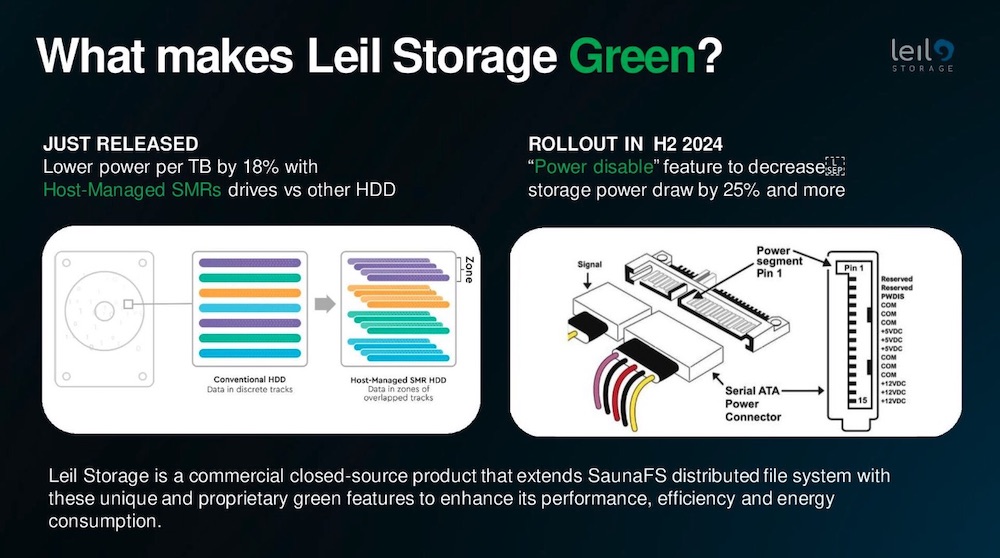
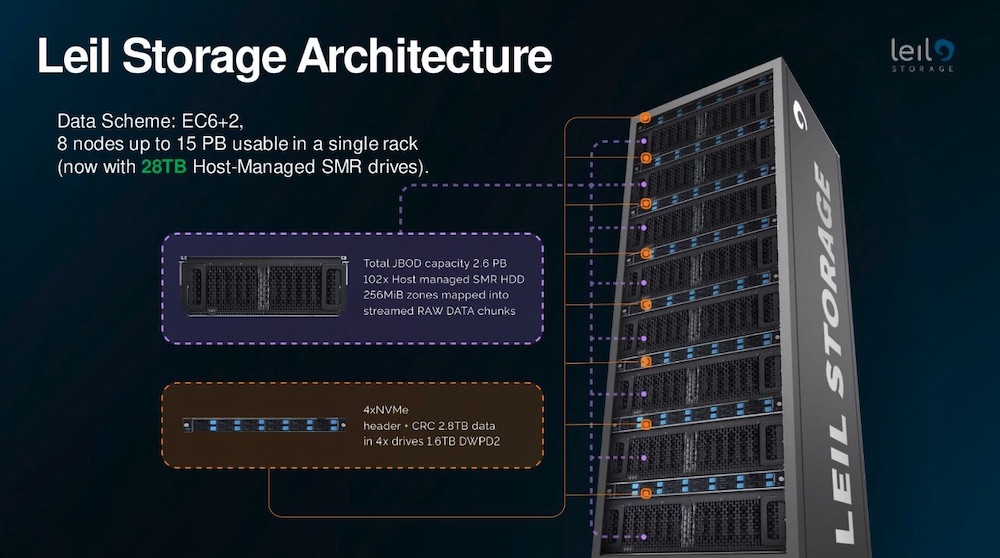
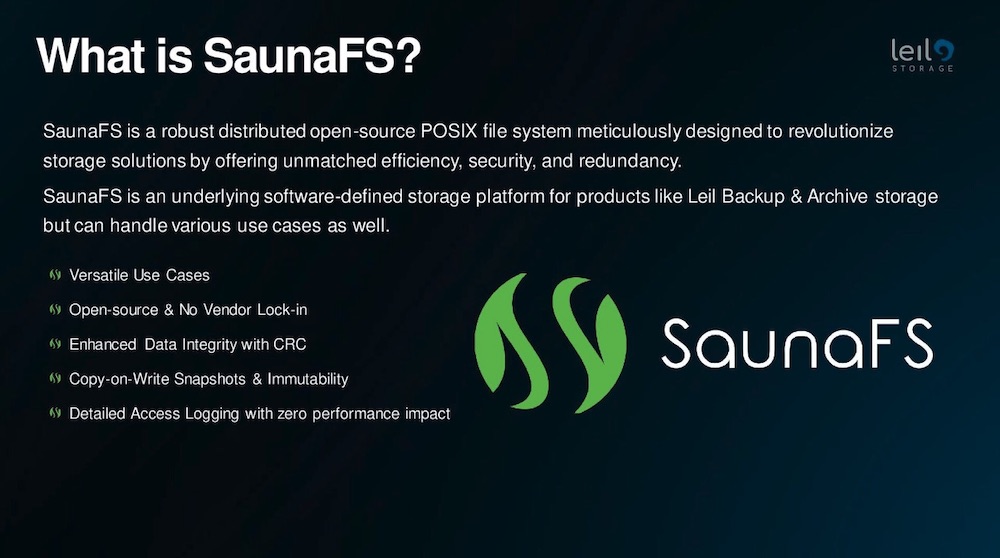
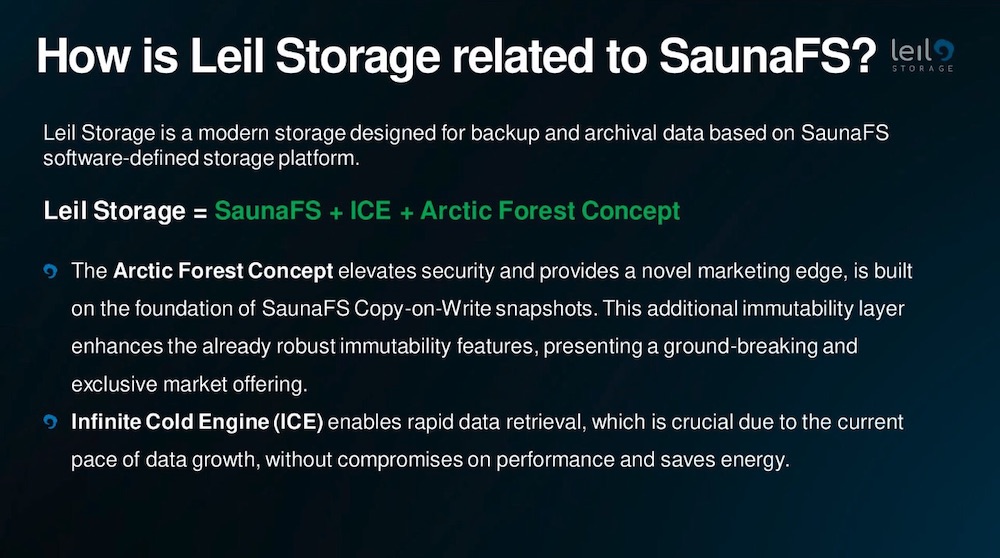






 Subscribe to our free daily newsletter
Subscribe to our free daily newsletter

